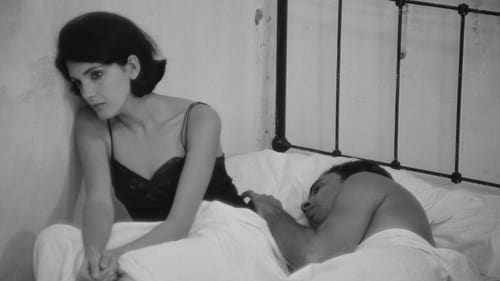
Interviewee
A look at the life and work of Cuban filmmaker Tomas Gutierrez Alea.

Editor

Editor
A handsome and mysterious stranger, played by Darío Grandinetti, walks into the town square of Villaserena one day and strategically places loudspeakers around the town, blaring a variety of musical tunes. Soon, he begins to sell airtime to the various locals, who broadcast their own personal love dedications and (more frequently) insults for all to hear. A subplot evolves between Abelardo (the stranger), Celeste (a young woman who is chained inside her father's house to stop her running away), and José (a young man).

Editor
The action is situated in Colombia on April 9, 1948, date in which took place the famous "Bogotazo". It is a story of love frustrated by political circumstances. Laura, a spinster schoolteacher, lives to Josefina and Santiago, public employee. The three characters will be besieged by 24 hours, targeted by snipers, will be forced to show such which are or they would have liked to be.

Editor
A telephone operator from Mexico City tries to support a family and her passion for popular dance.

Editor

Editor
The world of a young psychiatrist is shattered when she finds out that her husband is having an affair with one of her patients.

Editor
In 1914, during World Ward I, Amada, a bourgeois wife, falls in love with her cousin Marcial, a young idealist who is fighting against the Cuban regime in power.

Screenplay
In 1914, during World Ward I, Amada, a bourgeois wife, falls in love with her cousin Marcial, a young idealist who is fighting against the Cuban regime in power.

Director
In 1914, during World Ward I, Amada, a bourgeois wife, falls in love with her cousin Marcial, a young idealist who is fighting against the Cuban regime in power.

Writer
The story of Cecilia is a story of the society that dominated 19th-century Cuba, a society divided between whites, blacks, and those who were mixed, the mulattos. (Since the Spanish conquistadors killed off the Indian population in Cuba not long after they took over the island, there are no mestizos, or those of mixed-Indian blood in Cuba as in other Caribbean nations.) At any rate, the drama about the life and loves of Cecilia (Daisy Granados) takes place against the backdrop of graphically violent mistreatment of slaves and the rumors of a slave rebellion after the Cubans hear of slaves turning against their captors in Haiti.

Editor
Mexican drama film directed by Miguel Littín. It is based on a short story of the same name by Gabriel García Marquez. It was entered into the 30th Berlin International Film Festival

Editor
A bourgeois Cuban family of aristocratic origin locks itself into its mansion when the Cuban Revolution comes to power, waiting for the new regime to be overthrown. As time passes, they regress to older and older systems of policital order, from capitalism to feudalism to "primitive savagery."

Editor
Based on the events leading to the Spanish-America War of 1898. It reflects on the expansionist policies of the United States since its inception. A historical chronology that shows the consequences for Puerto Rico of the imperialist war against Spain: colonization and relentless attempts to annex it to the States.

Editor
The story of the Santa María School massacre of miners in 1907.

Editor
A pious plantation owner attempts to teach Christianity to 12 of his slaves by inviting them to participate in a reenactment of the Last Supper.

Writer
It is the story of a young man named Esteban, who was totally devoted to the cause of the Revolution against Fulgencio Batista. One day, Esteban is diagnosed with a cerebral aneurism, which causes him to take stock of his life as a revolutionary and to reconsider his relationships to his family--to his mother and brother, particularly--and his friends.

Editor
Based on the novel Francisco by Anselmo Suárez y Romero, "The Other Francisco" is a socio-economic analysis of slavery and class struggle through the retelling of the original novel. The film contrasts the romantic conceptions of plantation life found in Suárez Romero's novel with a realistic expose of the actual historical conditions of slavery throughout the Americas. It offers a critical analysis of the novel, showing how the author's social background led to his use of particular dramatic structures to convey his liberal, humanitarian viewpoint.

Writer
Rebuild, in the same place of events, a trial held in 1969 to four men, accused of sabotage for having caused the fire of a forest plan that caused the death of eight people and large material losses. At the same time, it analyzes retrospectively the circumstances that contributed to the occurrence of the crime.

Editor
During the socialist government of Marmaduke Grove in 1932, a group of villagers decide to take some land in the area of Palmilla. Almost like a mythical journey, problems arise when seated and in a position to bring the socialist ideal in the population. Everything becomes more complicated with rumors that the reactionary forces have overthrown the socialist government. A movie that because of the coup was not released in Chile and was only terminated by Littin in exile in Mexico.

Editor
In 1672 Cuban revolutionaries launch an uprising against the Spanish who are occupying the country.

Editor
A psychedelic combination of Shakespeare, rock & roll and Catholic symbolism in the shape of a Cuban ballet.

Editor
A história de três mulheres (com mesmo nome) que vivem em momentos históricos diferentes em Cuba. A primeira, vinda de familia rica, vive na Cuba do final do séc XIX em meio das lutas da independência, onde se apaixona por um rico espanhol, que dará inicio a um pesadelo pessoal. A segunda, de familia de classe média, vive na Cuba da década de 30 sob a ditadura do ditador Machado e se apaixona por um militante de esquerda. A terceira, já na cuba revolucionária, é uma camponesa que trabalha nos campos coletivos e que se casa com um homem machista e autoritário.

Writer
A história de três mulheres (com mesmo nome) que vivem em momentos históricos diferentes em Cuba. A primeira, vinda de familia rica, vive na Cuba do final do séc XIX em meio das lutas da independência, onde se apaixona por um rico espanhol, que dará inicio a um pesadelo pessoal. A segunda, de familia de classe média, vive na Cuba da década de 30 sob a ditadura do ditador Machado e se apaixona por um militante de esquerda. A terceira, já na cuba revolucionária, é uma camponesa que trabalha nos campos coletivos e que se casa com um homem machista e autoritário.

A história de três mulheres (com mesmo nome) que vivem em momentos históricos diferentes em Cuba. A primeira, vinda de familia rica, vive na Cuba do final do séc XIX em meio das lutas da independência, onde se apaixona por um rico espanhol, que dará inicio a um pesadelo pessoal. A segunda, de familia de classe média, vive na Cuba da década de 30 sob a ditadura do ditador Machado e se apaixona por um militante de esquerda. A terceira, já na cuba revolucionária, é uma camponesa que trabalha nos campos coletivos e que se casa com um homem machista e autoritário.

Editor
Em 1962, logo depois da Revolução de Fidel Castro em Cuba, Sergio fica sozinho em Havana, quando sua mulher se divorcia e sai do país, assim como seu melhor amigo. Acaba se casando com uma mulher que não desejava. Mas sua apatia e inação o condenam à solidão.




















